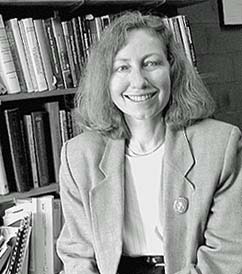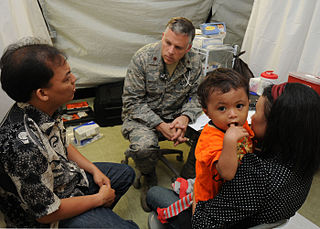
A cognitive bias is a systematic pattern of deviation from norm or rationality in judgment. Individuals create their own "subjective reality" from their perception of the input. An individual's construction of reality, not the objective input, may dictate their behavior in the world. Thus, cognitive biases may sometimes lead to perceptual distortion, inaccurate judgment, illogical interpretation, and irrationality.

Gaydar is a colloquialism referring to the intuitive ability of a person to assess others' sexual orientations as homosexual, bisexual or straight. Gaydar relies on verbal and nonverbal clues and LGBT stereotypes, including a sensitivity to social behaviors and mannerisms like body language, the tone of voice used by a person when speaking, overt rejections of traditional gender roles, a person's occupation, and grooming habits.
Diversity training is any program designed to facilitate positive intergroup interaction, reduce prejudice and discrimination, and generally teach individuals who are different from others how to work together effectively.
In psychology and cognitive science, a schema describes a pattern of thought or behavior that organizes categories of information and the relationships among them. It can also be described as a mental structure of preconceived ideas, a framework representing some aspect of the world, or a system of organizing and perceiving new information, such as a mental schema or conceptual model. Schemata influence attention and the absorption of new knowledge: people are more likely to notice things that fit into their schema, while re-interpreting contradictions to the schema as exceptions or distorting them to fit. Schemata have a tendency to remain unchanged, even in the face of contradictory information. Schemata can help in understanding the world and the rapidly changing environment. People can organize new perceptions into schemata quickly as most situations do not require complex thought when using schema, since automatic thought is all that is required.

Ziva Kunda was an Israeli social psychologist and professor at the University of Waterloo known for her work in social cognition and motivated reasoning. Her seminal paper "The Case for Motivated Reasoning", published in Psychological Bulletin in 1990, posthumously received the Scientific Impact Award from the Society of Experimental Social Psychology. Kunda authored the book Social Cognition: Making Sense of People.

LGBT stereotypes are stereotypes about lesbian, gay, bisexual and transgender (LGBT) people are based on their sexual orientations, gender identities, or gender expressions. Stereotypical perceptions may be acquired through interactions with parents, teachers, peers and mass media, or, more generally, through a lack of firsthand familiarity, resulting in an increased reliance on generalizations.
In psychology, a dual process theory provides an account of how thought can arise in two different ways, or as a result of two different processes. Often, the two processes consist of an implicit (automatic), unconscious process and an explicit (controlled), conscious process. Verbalized explicit processes or attitudes and actions may change with persuasion or education; though implicit process or attitudes usually take a long amount of time to change with the forming of new habits. Dual process theories can be found in social, personality, cognitive, and clinical psychology. It has also been linked with economics via prospect theory and behavioral economics, and increasingly in sociology through cultural analysis.
Aversive racism is a social scientific theory proposed by Samuel L. Gaertner & John F. Dovidio (1986), according to which negative evaluations of racial/ethnic minorities are realized by a persistent avoidance of interaction with other racial and ethnic groups. As opposed to traditional, overt racism, which is characterized by overt hatred for and discrimination against racial/ethnic minorities, aversive racism is characterized by more complex, ambivalent expressions and attitudes nonetheless with prejudicial views towards other races. Aversive racism arises from unconscious personal beliefs taught during childhood. Subtle racist behaviors are usually targeted towards African Americans. Workplace discrimination is one of the best examples of aversive racism. Biased beliefs on how minorities act and think affect how individuals interact with minority members.

In social psychology, a stereotype is a generalized belief about a particular category of people. It is an expectation that people might have about every person of a particular group. The type of expectation can vary; it can be, for example, an expectation about the group's personality, preferences, appearance or ability. Stereotypes are often overgeneralized, inaccurate, and resistant to new information. A stereotype does not necessarily need to be a negative assumption. They may be positive, neutral, or negative.
An implicit bias or implicit stereotype is the pre-reflective attribution of particular qualities by an individual to a member of some social out group.
Patricia Grace Devine is a professor of psychology at the University of Wisconsin–Madison, where she was the psychology department chair from 2009 to 2014. She was also the 2012 president of the Society for Personality and Social Psychology.

Cultural competence in healthcare refers to the ability for healthcare professionals to demonstrate cultural competence toward patients with diverse values, beliefs, and feelings. This process includes consideration of the individual social, cultural, and psychological needs of patients for effective cross-cultural communication with their health care providers. The goal of cultural competence in health care is to reduce health disparities and to provide optimal care to patients regardless of their race, gender, ethnic background, native languages spoken, and religious or cultural beliefs. Cultural competency training is important in health care fields where human interaction is common, including medicine, nursing, allied health, mental health, social work, pharmacy, oral health, and public health fields.
Nilanjana Dasgupta is a social psychologist whose work focuses on the effects of social contexts on implicit stereotypes - particularly on factors that insulate women in STEM fields from harmful stereotypes which suggest that females perform poorly in such areas. Dasgupta is a professor of Psychology and is the Director of the Institute of Diversity Sciences and the University of Massachusetts, Amherst.
Debiasing is the reduction of bias, particularly with respect to judgment and decision making. Biased judgment and decision making is that which systematically deviates from the prescriptions of objective standards such as facts, logic, and rational behavior or prescriptive norms. Biased judgment and decision making exists in consequential domains such as medicine, law, policy, and business, as well as in everyday life. Investors, for example, tend to hold onto falling stocks too long and sell rising stocks too quickly. Employers exhibit considerable discrimination in hiring and employment practices, and some parents continue to believe that vaccinations cause autism despite knowing that this link is based on falsified evidence. At an individual level, people who exhibit less decision bias have more intact social environments, reduced risk of alcohol and drug use, lower childhood delinquency rates, and superior planning and problem solving abilities.
Supplementing the medical model of depression, many researchers have begun to conceptualize ways in which the historical legacies of racism and colonialism create depressive conditions. Given the lived experiences of marginalized peoples, ranging from conditions of migration, class stratification, cultural genocide, labor exploitation, and social immobility, depression can be seen as a "rational response to global conditions", according to Ann Cvetkovich.
Implicit bias training programs are designed to help individuals become aware of their implicit biases and equip them with tools and strategies to act objectively, limiting the influence of their implicit biases. Some researchers say implicit biases are learned stereotypes that are automatic, seemingly associative, unintentional, deeply ingrained, universal, and can influence behavior.

Gender discrimination in health professions refers to the entire culture of bias against female clinicians, expressed verbally through derogatory and aggressive comments, lower pay and other forms of discriminatory actions from predominantly male peers. These women face difficulties in their work environment as a result of a largely male dominated positions of power within the medical field as well as initial biases presented in the hiring process, but not limited to promotions.
LGBT psychology is a field of psychology of surrounding the lives of LGBTQ+ individuals, in the particular the diverse range of psychological perspectives and experiences of these individuals. It covers different aspects such as identity development including the coming out process, parenting and family practices and support for LGBTQ+ individuals, as well as issues of prejudice and discrimination involving the LGBT community.
Intergroup relations refers to interactions between individuals in different social groups, and to interactions taking place between the groups themselves collectively. It has long been a subject of research in social psychology, political psychology, and organizational behavior.

Keith Maddox is a professor in the department of psychology at Tufts University. Maddox's research focuses on social cognition, and he is the director of the Tufts University Social Cognition Lab.








